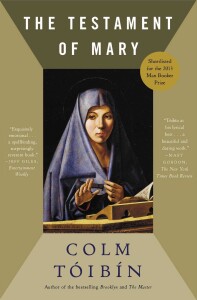
There are some authors whose every book is a must-read for me. Tóibín is one, ever since I picked up a battered copy of The Heather Blazing at a used book and tool sale in a market town in England twenty years ago. I persuaded my book club to read it as well and they’ve gone on to enjoy other novels by him. You’ll find several of his books in my blog: Brooklyn, New Ways to Kill Your Mother, The Empty Family, Nora Webster, and The Magician.
Not having been raised Catholic and a longtime feminist, I’ve given little thought to the culture that has built up around Mary, aside from discarding the stereotype of her as docile and obedient that many people hold up as the ideal toward which all women should strive. As a mother, I could feel her horror and grief at the death of her son, but that made me dislike even more the priestly glorification of human sacrifice. Well, I guess they would say half-human.
However, this first-person narrative captured me immediately, giving me a new and completely plausible image of an historical Mary. Here, she is older and alone, living in Ephesus, a city known for its Temple of Artemis, located in what is now Turkey, thus far enough away from Rome to offer safe haven from her Roman pursuers. There, she is visited by two of her son’s disciples who watch and support her even as they question her repeatedly about her son’s life to bolster their own narratives. She says:
They think that I do not know the elaborate nature of their desires. But nothing escapes me now except sleep . . . They are too locked into their vast and insatiable needs and too dulled by the remnants of a terror we all felt then to have noticed that I remember everything. Memory fills my body as much as blood and bones.
She considers those who followed her son a “group of misfits he gathered around him, men who could not look a woman in the eye,” and judges herself with the same brutal clarity. In this slim novella, she tells us her story, the one she holds in every part of her body.
And it is an utterly credible story. If there truly was an historical Jesus—his name is never mentioned in this book—then this portrait of a happy, playful child grown into a cold and distant man is one I can believe. It is the story of too many men, and a few women, who have embraced the portrait of themselves they see in others’ eyes and the power that comes with it.
It is not the story that has come down to us; that’s the one crafted by his followers, the one she disputes. It is still an enthralling one. A mother, telling us about her son—her son. She discounts the stories she hears about his so-called miracles as exaggerations by the crowd that follows him. Even her glancing acquaintance with the results, such as meeting the undead Lazarus, are ambiguous.
Tóibín has crafted a tender and agonizing book that has changed my view of Mary and her son.
What novel of Colm Tóibín’s have you read? What did you think about it?
